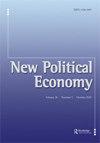为什么各国的技能体系各不相同?国家在维持增长模式的技能体系制度中的作用
IF 3.8
2区 经济学
Q1 ECONOMICS
引用次数: 0
摘要
本文将技能形成的比较政治经济学文献与增长模型文献相结合,分析了国家在后期工业化国家技能体系中的作用。它的重点是墨西哥和土耳其,这两个国家构成了最类似案例分析的关键案例。文章表明,墨西哥和土耳其在经济自由化后遵循了不同的增长模式,这导致了两个关键技能体系机构的不同国家角色,即最低工资和职业教育与培训(VET)体系。在墨西哥,政府将这些机构与“依赖降级”的增长模式结合起来,这种模式依赖外部需求和投资,产业升级程度低,有时会降级,工人阶级凝聚力最低。为了吸引外国投资和降低出口产品的价格,将劳动力成本降至最低是优先考虑的事项,这导致了墨西哥极低的工资水平和自由的职业教育培训体系。土耳其的增长模式是“国内升级”,国内投资和需求的作用更高,产业升级和工人阶级社会凝聚力有所提高。确保较高的最低工资和全面的职业教育培训体系是土耳其维持这一增长模式的关键策略,从而导致了相对较高的最低工资和中央集权的职业教育培训体系。本文章由计算机程序翻译,如有差异,请以英文原文为准。
Why do national skill systems vary? The state’s role in skill system institutions for maintaining growth models
This article combines the comparative political economy of skill formation literature with the one on growth models to analyse the state's role in skill systems of late industrialising countries. It focuses on Mexico and Turkey, which constitute crucial cases for a most similar case analysis. The article shows that Mexico and Turkey followed different growth models after their economic liberalisation, which led to distinct state roles in two key skill system institutions, namely the minimum wage and the vocational education and training (VET) system. In Mexico, the state aligned these institutions with the ‘dependent-downgrading' growth model, which was reliant on external demand and investments with low industrial upgrading and sometimes downgrading, and minimal working-class cohesion. Minimising labour costs was prioritised to attract foreign investment and to reduce the prices of exports, leading to extremely low wages and a liberal VET system in Mexico. In Turkey, the growth model was ‘domestic-upgrading’ with higher role of domestic investments and demand, and some improvements in industrial upgrading and working-class social cohesion. Ensuring high minimum wage and comprehensive VET system constituted key strategies for the state to maintain this growth model in Turkey, leading to relatively higher minimum wage and a statist VET system.
求助全文
通过发布文献求助,成功后即可免费获取论文全文。
去求助
来源期刊

New Political Economy
Multiple-
CiteScore
10.10
自引率
9.50%
发文量
41
期刊介绍:
New Political Economy aims to create a forum for work which combines the breadth of vision which characterised the classical political economy of the nineteenth century with the analytical advances of twentieth century social science. It seeks to represent the terrain of political economy scholarship across different disciplines, emphasising original and innovative work which explores new approaches and methodologies, and addresses core debates and issues of historical and contemporary relevance.
 求助内容:
求助内容: 应助结果提醒方式:
应助结果提醒方式:


